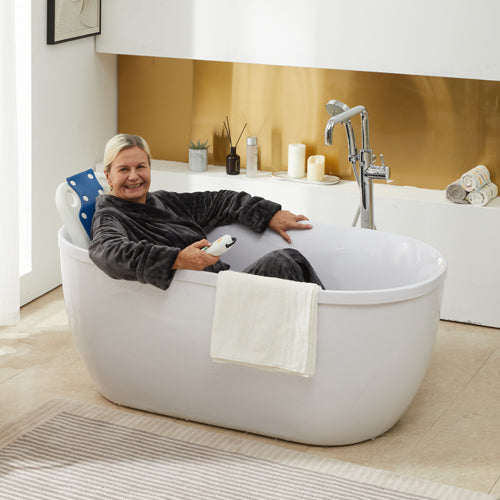Yes, in some cases, Medicare Part B may cover mobility scooters if they are deemed medically necessary for individuals with mobility impairments. However, specific criteria must be met, and coverage may vary depending on the individual's circumstances and the type of mobility scooter needed.
What’s the connection between health insurance and mobility scooters?

The connection between medical insurance and mobility scooters is mainly reflected in the following aspects:
Coverage: Some health insurance plans may include funding for mobility scooters, especially if the devices are medically necessary. This usually applies to people who require assistive walking equipment due to injury or disability.
Eligibility: In order to get Medicare funding for a mobility scooter, a doctor's recommendation or prescription is usually required. A doctor will need to certify that the mobility scooter is needed for medical necessity and not just for convenience.
Reimbursement: In cases where health insurance covers mobility scooters, users may want to understand the insurance company's reimbursement rules for purchasing such devices, including reimbursement rates, deductibles, and whether there are specific vendor requirements.
Types and sizes: Health insurance may only provide coverage for certain types or sizes of mobility scooters. This may be based on the device's safety, functionality, and whether it meets the patient's specific needs.
Repair and replacement: Some health insurance plans may also include support for repair and replacement of mobility scooters, especially if these devices become damaged due to long-term use.
In short, the connection between medical insurance and mobility scooters is that medical insurance can provide financial support to people who need such assistive devices under certain conditions, thereby helping them improve their quality of life. Users should check with their insurance provider to learn whether their insurance plan covers this type of device, as well as the associated eligibility criteria and reimbursement rules.
How Medicare Covers Mobility Scooters

1. Medicare's Durable Medical Equipment Policy
Medicare's coverage of mobility scooters falls under its policy regarding Durable Medical Equipment (DME). DME refers to equipment that serves a medical purpose, is able to withstand repeated use, and is appropriate for home use. This includes items such as wheelchairs, walkers, and yes, mobility scooters.
2. Definition of Durable Medical Equipment (DME)
Under Medicare guidelines, Durable Medical Equipment (DME) encompasses a wide range of devices designed to provide therapeutic benefits to individuals with certain medical conditions or illnesses. These items are deemed medically necessary and prescribed by a healthcare provider.
3. How Mobility Scooters Fit into DME
Mobility scooters are classified as Durable Medical Equipment (DME) when they are prescribed by a healthcare provider to aid individuals with mobility impairments. As such, they meet the criteria set forth by Medicare for coverage under its DME policy.
4. Coverage Details for Mobility Scooters under Medicare
When it comes to coverage for mobility scooters, Medicare has specific conditions that determine whether an individual qualifies for assistance in obtaining one.
5. Conditions Under Which Medicare Covers Mobility Scooters
Medicare covers mobility scooters when they are deemed medically necessary for the patient's condition and when certain eligibility criteria are met. This includes the requirement that the scooter is needed for use within the individual's home and that they have difficulty performing daily living activities without it.
6. Partial Cost Coverage and Rental Options
In some cases, Medicare may cover only a portion of the cost of a mobility scooter, requiring the patient to pay the remaining amount. Additionally, there is an option to rent a scooter instead of purchasing one outright, providing flexibility for individuals who may only need temporary assistance with mobility.
Qualifying for a Mobility Scooter through Medicare
1. Medical Necessity for a Mobility Scooter
Determining the medical necessity for a mobility scooter involves an assessment by healthcare professionals to evaluate the individual's condition and mobility limitations. Doctors consider various factors to determine if a mobility scooter is essential for improving the patient's quality of life and independence.
2. How Doctors Determine Medical Necessity
Healthcare providers assess the patient's ability to perform daily activities, such as walking, standing, and moving around independently. They also consider any existing medical conditions or physical impairments that significantly impact mobility. Through thorough evaluations, doctors can ascertain whether a mobility scooter is medically necessary to address the individual's mobility challenges effectively.
3. Documentation Requirements
Healthcare providers must maintain detailed records of their assessments, including information about the patient's medical history, current health status, and specific mobility limitations. These documented findings serve as essential evidence when justifying the need for a mobility scooter as part of Medicare coverage.
4. Eligibility Requirements for Medicare Coverage
Meeting specific eligibility requirements is fundamental to accessing Medicare coverage for a mobility scooter. Individuals must fulfill certain criteria to qualify for financial assistance in obtaining this essential mobility aid.
5. Specific Criteria to Meet for Coverage
To be eligible for Medicare coverage of a mobility scooter, individuals must demonstrate that they have difficulty ambulating within their home environment without substantial assistance.
This includes challenges with walking or moving around independently due to physical impairments or medical conditions. Additionally, they must provide evidence that supports the medical necessity of using a mobility scooter as prescribed by their healthcare provider.
6. Role of the Primary Care Provider in the Process
The primary care provider plays an integral role in facilitating access to Medicare coverage for a mobility scooter. They are responsible for evaluating the patient's condition, determining medical necessity, and prescribing the appropriate mobility aid based on individual needs.
Furthermore, healthcare providers collaborate with patients to ensure that all necessary documentation is accurately completed and submitted as part of the Medicare application process.
Steps to Obtain a Mobility Scooter with Medicare Support

Navigating the process of obtaining a mobility scooter with Medicare support involves essential steps that ensure individuals receive the necessary assistance in acquiring this vital mobility aid.
1. Consulting with a Healthcare Provider
Seeking professional medical advice is the first step in determining the suitability and medical necessity of a mobility scooter. Healthcare providers, including physicians and specialists, can help assess an individual's mobility limitations and prescribe appropriate solutions.
2. Importance of Professional Medical Advice
3. Preparing for the Consultation
Before consulting with a healthcare provider regarding a mobility scooter, individuals should prepare relevant information about their medical history, current health status, and specific mobility limitations.
This includes documenting any existing conditions or impairments that significantly impact their ability to move around independently. By providing comprehensive details, individuals can facilitate an informed discussion with their healthcare provider regarding the potential need for a mobility scooter.
4. Navigating the Medicare Process
Once the medical necessity for a mobility scooter has been established through professional consultation, navigating the Medicare process is essential to access financial assistance for obtaining this mobility aid.
5. Submitting Necessary Documentation
Submitting essential documentation to Medicare is a critical aspect of securing coverage for a mobility scooter. This documentation includes detailed records from healthcare providers outlining the medical necessity of the prescribed mobility aid.
Additionally, individuals must provide personal information and evidence demonstrating their eligibility for Medicare coverage based on specific criteria.
6. Following Up on Medicare's Decision
After submitting all necessary documentation, it is important to follow up on Medicare's decision regarding coverage for the mobility scooter. This may involve communicating with Medicare representatives to inquire about the status of the application and any additional steps required to finalize coverage.
By actively engaging in this process, individuals can ensure that they receive timely decisions regarding their eligibility for financial assistance in obtaining a mobility scooter through Medicare.
Recap of Medicare's Coverage for Mobility Scooters
Medicare's coverage for mobility scooters is contingent upon meeting specific criteria and demonstrating the medical necessity for these essential mobility aids.
The policy regarding Durable Medical Equipment (DME) encompasses provisions for individuals with mobility impairments, ensuring that they have access to devices that enhance their independence and quality of life.
Understanding the role of healthcare providers in evaluating medical necessity and prescribing suitable solutions is crucial for navigating the process of obtaining a mobility scooter through Medicare.
Medicare's guidelines outline the conditions under which individuals may qualify for coverage, emphasizing the importance of fulfilling eligibility requirements and submitting necessary documentation to support their application.
Additionally, partial cost coverage and rental options provide flexibility for individuals who require temporary assistance with mobility, offering alternatives to outright purchase.
Conclusion
The expertise and guidance provided by healthcare professionals play a key role in determining the suitability and medical necessity of a mobility scooter, ensuring individuals receive a tailored solution to address their unique mobility challenges.
Mobility tools such as electric skateboards not only help enhance mobility but also foster independence, allowing individuals to drive with flexibility, freedom and confidence.
By receiving Medicare support for mobility scooters, individuals can experience a higher quality of life while overcoming mobility limitations.
Click to learn: 5 key facts on medicare and scooter coverage







